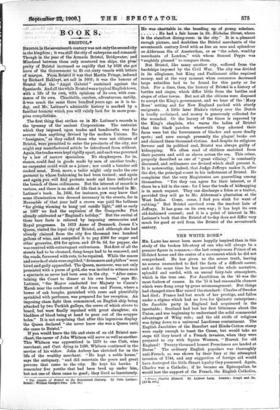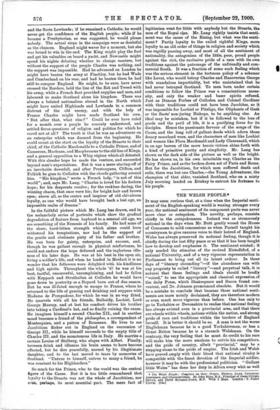THE WHITE ROSE.*
Mn. LANG has never been more happily inspired than in this study of the broken life-story of one who will always be a premier figure in romance,—the last conspicuous Prince of an ill-fated house and the centre of a movement which he did not comprehend. He has given us the severe truth, leaving no source unsearched to find the facts of a difficult career, and at the same time he has invested the whole narrative, splendid and sordid, with an unreal fairy-tale atmosphere, which is the true one. For Jacobitisin in the '45 was the most forlorn of causes. In the '15 it had reasonable chances which were flung away by gross mismanagement. But things had changed since Mar raised the standard : Charles of Sweden had died ; France had lost much of her prestige, and fallen under a regime which had no love for Quixotic enterprises ; the Jacobite party in England had acquiesced in the inevitable ; Scotland had lost her first bitterness about the Union, and was beginning to understand the solid commercial advantages of Whig rule ; and the old strife of religions was dying down to a universal Laodicean contentment. The English Jacobities of the Beaufort and Hinde-Cotton stamp were ready enough to toast the Cause, but would take no steps till they heard of a French invasion, when they were prepared to cry with Squire Western, "Hurrah for old England ! Twenty thousand honest Frenchmen are landed at Dover." The ordinary English populace was thoroughly anti-French, as was shown by their fury at the attempted invasion of 1744, and any suggestion of foreign aid would have destroyed the little Stuart loyalty they possessed. Again, Charles was a Catholic; if he became an Episcopalian, he would lose the support of the French, the English Catholics, • PrInoe Charlet Edward. By Andrew Laing. London: Goupll and 0o. [Z3 3e. net.]
and the Scots Lowlands; if he remained a Catholic, he would never get the confidence of the English people; while if he became a Presbyterian, as was suggested, he would please nobody. The actual steps in the campaign were as doubtful as the chances. England might waver for a moment, but she was bound to win in the end. The King might play the fool and get his valuables on board a yacht, and Newcastle might spend his nights debating whether to change masters, but without the support of the people Charles was nothing, and the support was impossible. Had he advanced on London he might have beaten the army at Finchley, but he had Wade and Cumberland on his rear, and had he beaten them he had still to conquer England. He might, to be sure, have never crossed the Borders, held the line of the Esk and Tweed with his army, while a French fleet provided supplies and men, and laboured to make Scotland alone his kingdom. There was always a belated nationalism abroad in the North which might have united Highlands and Lowlands in a common distrust of the old enemy, and with the help of France Charles might have made Scotland his own.
"But after that, what else ? " Could he ever have ruled for a month over a people he scarcely understood, and settled fierce questions of religion and politics for which he cared not at all ? The truth is that he was an adventurer on an enterprise which was doomed from the beginning. He could count at the start on the loyalty of the Stuarts to their chief, of the Catholic Macdonalds to a Catholic Prince, and of Ca.merons, Macleans, and Macphersons to the old line of Kings, and a general opposition to a Whig regime which all detested. With this slender hope he made the venture, and succeeded beyond men's expectations. But it was a mere staving-off of an inevitable downfall, and after Prestonpans, Clifton, and Falkirk he goes to Culloden with the clouds gathering around him. "His kingdom," wrote a French lady, "is not of this world"; and, says Mr. Lang, "Charles is loved for his forlorn hope; for his desperate resolve ; for the reckless daring, the winning charm, that once were his; for bright hair and brown eyes; above all, as the centre and inspirer of old chivalrous loyalty, as one who would have brought back a lost age, an impossible realm of dreams."
In the faithful picture which Mr. Lang has drawn, and in the melancholy series of portraits which show the gradual degradation of feature from boyhood to a sensual old age, we see something of the Nemesis of his family. He had none of the sheer, hard-bitten strength which alone could have withstood his temptations, nor had he the support of the gentle and obstinate piety of his father and brother. He was born for gaiety, enterprise, and success, and, though he was gallant enough in physical misfortunes, he could not endure the hope deferred and the inglorious idle- ness of his later days. He was at his best in the open air, living a soldier's life, and when he landed in Moidart it is no wonder that his followers were delighted with his kindliness and high spirits. Throughout the whole '45 he was at his best, tactful, resourceful, uncomplaining, and bad be fallen with Keppoch and Strathallan at Culloden he would have gone down to posterity as a Bayard born out of due season.
But he was ill-fated enough to escape to France, where he returned to the life of gaming and drinking and suppers with Madame de Pompadour, for which he was in no way fitted.
He quarrels with all his friends, Balhaidy, Lochiel, Lord George Murray, and at last his conduct drives his brother into taking a Cardinal's hat, and so finally ruining the cause. He imagines himself a second Charles XII., and in another mood becomes a friend of the philosophes, a correspondent of Montesquieu, and a patron of Rousseau. He lives to see Jacobitism flicker out in England on the succession of George III., while he himself succeeds to the empty title of Charles III. and the monotonous life in Italy. He marries a certain Louise of Stolberg, who elopes with Alfieri. Finally, between drink and idleness his brain seems to have become affected, but he dies peacefully, nursed by his illegitimate daughter, and to the last moved to tears by memories of Scotland. "Untrue to himself, untrue to many a friend, he was constant to his Highlanders."
So much for the Prince, who to the world was the central figure of the Cause. But it is too little remembered that loyalty to the Stuarts was not the whole of Jacobitism, nor even, perhaps, its most essential part. The mere fact of legitimism went for little with anybody but the Stuarts, the men of the Royal clan. Mr. Lang rightly insists that senti- ment was the cause of the Rising, but what was the senti- ment? Partly loyalty to the exiled rightful Kings, more loyalty to an old order of things in religion and society which was rapidly passing away, and most of all the sentiment of nationality, the antagonism of the little, poor, proud people against the rich, the exclusive pride of a race with its own traditions against the patronage of the unfriendly and com- mercial South. It was a fraction of some such feeling which was the serious element in the tortuous policy of a schemer like Lovat, who would betray Charles and Hanoverian George with scandalous impartiality, but who maintained that he had never betrayed Scotland. To men born under certain conditions to follow the Prince was a conscientious neces- sity, and only the weaker and baser spirits refused. Just as Duncan Forbes of Culloden and Colonel Gardiner with their traditions could not have been Jacobites, so it was impossible for Lochiel or Pitsligo, the Oliphants of Gask or the Scots' non-juring Bishops, to be anything else. An ideal may be mistaken, but if it be followed to the loss of goods and the peril of life, it is a purifying force for its disciples. Hence the passionate fervour of the songs of the Cause, and the long roll of gallant deeds which adorn those dreary moorland wars, and the characters of men like Lochiel and women like Flora Macdonald and Lady Clanranald, which in an age barren of the more heroic virtues shine forth with a kind of primitive purity and simplicity. Mr. Lang has shown us the dark side of the picture as well as the bright. He has shown us, in his own inimitable way, Charles as the Fairy Prince, and as the broken-down sot of Paris and Rome. But for the Jacobitism, for which men suffered death and exile, there was but one Charles.—the Young Adventurer, the champion of that elder, vanished Scotland, who on a misty July morning landed on Eriskay to entrust his fortunes to his people.







































 Previous page
Previous page